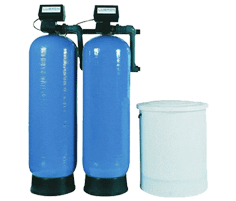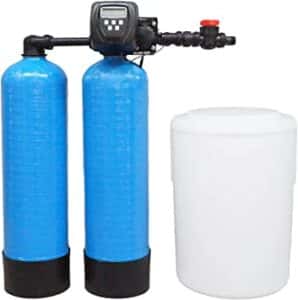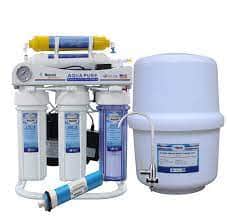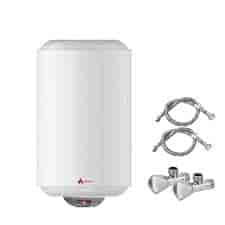Best Industrial Water Softener
- Available water flow is between 14 GPM Up to 305 GPM (gallons per minute)
- FRP Vessel Size Available: 13×54, 1665, 2160, 24×69, 30×72, 36×73, 42×78, 63×103
- Clack Control Valve 1” up to 3”
- Brine Tank: 100, 150, 200, up to 500 Litter
- All custom-made models have four distinct cycles of operations:
- Backwash – hydraulic cleaning; up-flow
- Slow rinse – displaces residual brine; down-flow
- Brine refill – restores resin to sodium form; down-flow
- Fast rinse – prepares softening resin for service cycle; down-flow.
Aqua Filter Industrial Water Softener
If you’re looking for a more affordable way to soften your water, consider an Aqua Filter Industrial Water Softener. This model is great for businesses that need to supply clean, soft water to large volumes of people. It is a reliable system that can relieve you from the worry of hard water damage and scale buildup in your plumbing systems and fixtures
- Available water flow is between 14 GPM Up to 305 GPM (gallons per minute)
- FRP Vessel Size Available: 13×54, 1665, 2160, 24×69, 30×72, 36×73, 42×78, 63×103
- Clack Control Valve 1” up to 3”
- Brine Tank: 100, 150, 200, up to 500 Litter
- All custom-made models have four distinct cycles of operations:
- Backwash – hydraulic cleaning; up-flow
- Slow rinse – displaces residual brine; down-flow
- Brine refill – restores resin to sodium form; down-flow
- Fast rinse – prepares softening resin for service cycle; down-flow.
Description
[Include a captivating introduction to the topic of industrial water softeners. Highlight the importance of water treatment in industries, the negative effects of hard water, and the need for effective water softening systems.]
Benefits of Industrial Water Softeners:
[Discuss the advantages and benefits of using industrial water softeners in different industries. Highlight how these systems can improve the efficiency and longevity of industrial equipment, reduce maintenance costs, and prevent scale buildup.]
Scale Prevention and Equipment Protection:
[Explain how industrial water softeners effectively prevent scale buildup in industrial equipment, such as boilers, cooling towers, and heat exchangers. Discuss the detrimental effects of scale on equipment performance and energy efficiency.]
Improved Efficiency and Productivity:
[Describe how water softening systems enhance the efficiency and productivity of industrial processes. Discuss how softened water reduces the need for excessive detergent use, improves cleaning efficiency, and enhances the performance of industrial machinery.]
Cost Savings:
[Highlight the cost-saving benefits of industrial water softeners. Discuss how these systems help reduce energy consumption, minimize equipment breakdowns, and extend the lifespan of industrial equipment, resulting in significant cost savings.]
Features to Consider in Industrial Water Softeners:
[Provide a list of key features and factors to consider when choosing the best industrial water softener for specific applications.]
Capacity and Flow Rate:
[Discuss the importance of considering the capacity and flow rate requirements of industrial operations when selecting a water softener. Highlight how choosing a system with the appropriate capacity ensures consistent water softening performance.]
Regeneration Process:
[Explain the different types of regeneration processes used in industrial water softeners, such as timer-controlled, meter-controlled, or demand-initiated regeneration. Discuss the advantages and disadvantages of each method.]
Water Quality Monitoring:
[Highlight the significance of water quality monitoring features in industrial water softeners. Discuss how advanced monitoring systems can provide real-time data on water hardness levels and enable proactive maintenance and troubleshooting.]
Scalability and Modular Design:
[Emphasize the importance of scalability and modular design in industrial water softeners. Discuss how modular systems can easily accommodate changing water treatment needs and expansions in industrial operations.]
Top Industrial Water Softeners in the Market:
[Present a list of top-rated industrial water softeners, providing a brief overview of each system and its key features.]
1. [Industrial Water Softener Model 1]:
- Key Features:
- High capacity: [capacity in gallons/liters]
- Advanced regeneration process: [timer-controlled/meter-controlled/demand-initiated regeneration]
- Water quality monitoring: [yes/no]
- Scalable and modular design: [yes/no]
- Price: [$x,xxx]
- Customer Rating: [out of 5 stars]
2. [Industrial Water Softener Model 2]:
- Key Features:
- High capacity: [capacity in gallons/liters]
- Advanced regeneration process: [timer-controlled/meter-controlled/demand-initiated regeneration]
- Water quality monitoring: [yes/no]
- Scalable and modular design: [yes/no]
- Price: [$x,xxx]
- Customer Rating: [out of 5 stars]
[Provide a similar overview for other top-rated industrial water softeners.]
Conclusion:
[Summarize the key points discussed in the article and emphasize the importance of choosing the right industrial water softener for optimal water treatment in industries.]




